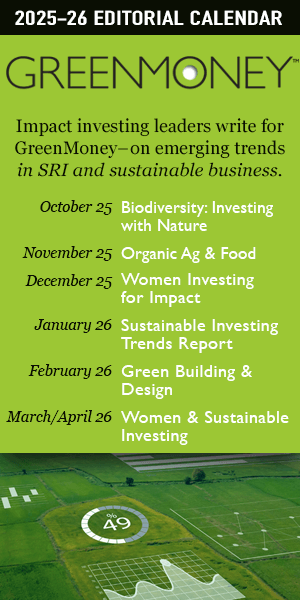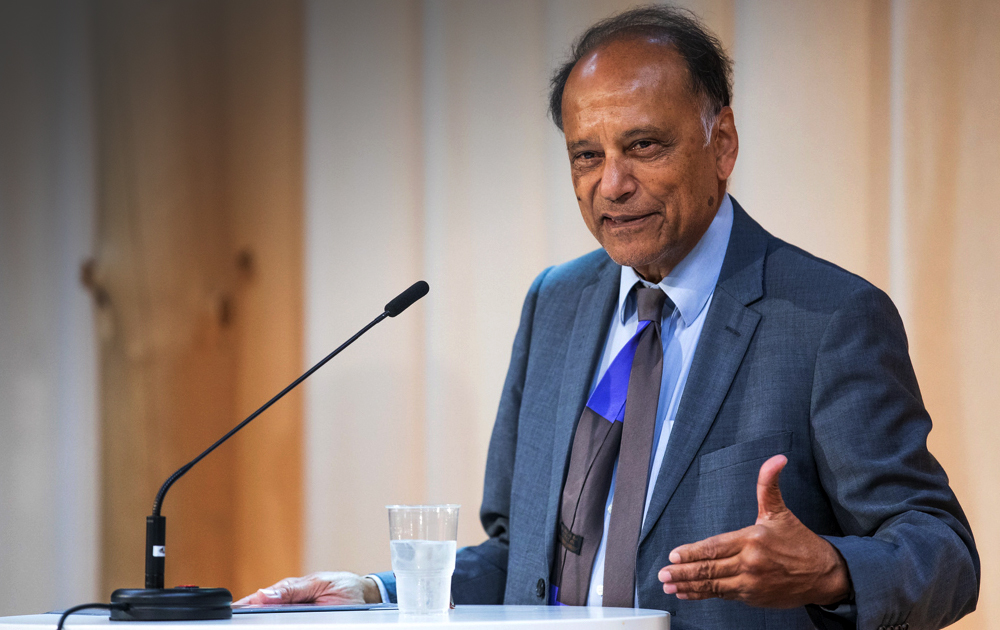The Orlando World Center Marriott isn’t a natural home to a burgeoning investing movement. Canned music plays in the elevators, and vacationers amble through the lobby en route to Epcot. But behind a closed ballroom door a few feet away, all eyes are on the band. The vibe is a prayer meeting/concert. And the attendants—more than 2,000 of them—are swaying to the music, many with palms held aloft and eyes closed in ecstasy. These are the faithful, led by the disciple Timothy’s instructions to “be rich in good works, to be generous and ready to share.” Most attendees are financial advisors, as content in the realm of the secular as the divine.
Welcome to the annual conference of Kingdom Advisors, a rapidly expanding association of advisors that aims “to carry biblical financial wisdom to their clients, peers, and community.” Today’s rocky markets pose a challenge for advisors. Many Kingdom advisors hope that a new kind of conversion—the conversion of conventional portfolios to so-called biblically managed portfolios—will help them retain clients and bring in new ones.
Nobody knows exactly how large the faith-based investment market is after factoring in the assets of individuals and institutions. Most of the information isn’t public. But in a recent report, Morningstar quantitative analysts Manan Agarwal and Sabeeh Ashhar sized up a significant portion of the faith-based market: Christian and Islamic exchange-traded and mutual funds.
Although a small slice of the overall fund universe, faith-based funds are growing in number, and more investors are choosing to invest with their values as well as for returns.
Evolution of Values-Based Investing
Following religious and ethical guidelines in investing has probably been around as long as investing itself. The Quakers notably spoke out against profiting from the slave trade, and in 1760, John Wesley, founder of the Methodist movement in the Church of England, said members “ought not to gain money at the expense of life or by losing our souls.”
Flash forward to the 20th century: Another milestone came in 1971 when the Episcopal Church filed a shareholder resolution urging General Motors GM to stop manufacturing in apartheid South Africa. Catholics and other churches joined the movement, forming the Interfaith Center for Corporate Responsibility. Today, the ICCR includes more than 300 global institutional investors overseeing more than $4 trillion in managed assets. They include the Unitarian Universalist Association, the Presbyterian Church, the Sisters of St. Francis, and the Rabbis and Cantors Retirement Plan, as well as fund providers such as Everence Financial, sponsor of Praxis Mutual Funds, which has $2.5 billion in assets and has its roots in the Mennonite Church, and Wespath Investment Management, which provides funds that are informed by the values of the United Methodist Church.
The ICCR’s anti-apartheid push galvanized socially responsible investing. Tim Smith, senior policy advisor to the ICCR, says that “religious investors played that key catalytic role.” Socially responsible funds prioritize positive social change by considering both financial returns and moral values in investment decision-making. That has evolved into the modern sustainable investing movement, which relies heavily on environmental, social, and governance research. An ESG-based fund uses such data as part of its fiduciary duty to consider the material risks to its investment returns, such as climate risk and diversity risk.
Agarwal and Ashhar say faith-based investing is a version of socially responsible investing. Although it shares some of sustainable investing’s traits and uses ESG information, a faith-based fund has a dual mandate: In addition to its fiduciary duty, the fund also reflects the values held by a religious community.
“ESG doesn’t have a moral compass; it’s not necessarily mission-aligned, and it’s not impactful,” says Sonia Kowal, president of Zevin Asset Management, a sustainable-investment specialist that also oversees accounts for faith-based investors. “It’s just information that analysts can use.”
To some conservative religious investors, however, the term ESG has become anathema since influential Republicans demonized it while rallying behind the “anti-woke” flag in 2022. Inspire Advisors, which runs “biblically responsible” ETFs with tickers like BIBL, GLRY, and WWJD (for “What Would Jesus Do?”), originally added ESG to the names of its funds that didn’t already include it, then just months later removed the term from all its products in August 2022. Why the pivot? “ESG has become weaponized by liberal activists to push forward their harmful, social Marxist agenda,” CEO Robert Netzly said at the time. For good measure, Netzly compared ESG to CRT, or critical race theory, “as acronyms worth fighting against.”
Whether its adherents want to use the term or not, however, faith-based investing falls under the same umbrella as ESG.
Potential for Growth
There’s reason to believe faith-based investing will grow more popular. Customized investing is a growing area of wealth management, and faith is just one more way investors can include their preferences in the process.
Jean Case, the founder of FWIW (For What It’s Worth), a financial news and education site aimed at Generation Z, and head of the Case Foundation, says that one of the most widely searched terms on the site is, “What is faith-based investing?”
Says Mark Regier, vice president of stewardship investing for Praxis Mutual Funds and its parent Everence, “I can’t imagine talking about being values-driven and not wanting to know where the money is going.”
Some believe it’s a religious duty to invest. “We all believe in tithing and know we should give at least 10% to our church,” says David Spika, president of GuideStone Funds, which serves a Baptist clientele. “We should also be using our assets to influence the kingdom or to impact companies.”
In theory, the potential market is huge, considering the enormous moral authority exerted by religious institutions. The world’s population is around 8 billion. According to the Pew Research Center, Christians accounted for 31.4% of the global population in 2010 and Muslims for 23.2%. But relative to the investable universe, assets in faith-based ETFs and mutual funds are still a drop in the bucket.
In their report, Agarwal and Ashhar tried to measure the Christian and Shariah fund market. (Shariah is Islamic canonical law.) They counted 850 faith-based funds and ETFs globally, with combined assets of just over $100 billion. (Vanguard 500 Index VFINX by itself has assets of $323 billion across its share classes.) Almost 85% of faith-based funds are Shariah-compliant, but they account for only $45 billion of the asset base.
Christian funds make up the rest. Roughly 95% of Christian-values funds are based in the United States, whereas 60% of Shariah funds are domiciled in Malaysia, Indonesia, and Saudi Arabia. That said, the largest faith-based offering is a U.S.-based Shariah fund: Amana Growth AMAGX, which has $3.9 billion in assets.
Investors in these funds need not necessarily sacrifice performance. The 15 largest funds have solid records overall. Most of them have the three-year record required to calculate a Morningstar Rating, which indicates a fund’s risk/reward profile within its Morningstar Category. Almost all of the ratings were 3-stars or higher as of the end of September.
While the total assets in these funds are still relatively small, asset managers clearly anticipate a growing market. From 2019 to 2021, there was a surge in the number of new faith-based products being launched. The recent proliferation can be attributed to a combination of factors, including the rising demand for ethical and ESG investments, increased cultural and social awareness, and a growing desire to align financial decisions with personal values and beliefs, Agarwal and Ashhar say.
Read the complete version of this Morningstar magazine article, written by Leslie Norton and Ruth Saldanha of Morningstar, which includes some interesting charts and graphs.


















